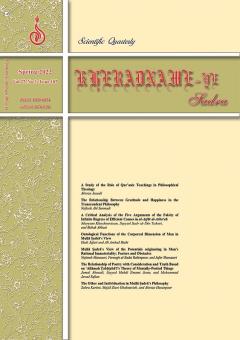The Other and Individuation in Mullā Ṣadrā’s Philosophy
Subject Areas : ملاصدراپژوهی و اندیشۀ حکمت متعالیهZahra Karimi 1 , Majid Ziaei Ghahnavieh 2 , Alireza Hasanpour 3
1 - PhD candidate of Islamic Philosophy and Kalam, Ilam University, Ilam, Iran
2 - Assistant Professor, Islamic Philosophy and Kalam, Ilam University, Ilam, Iran
3 - Faculty member of Ilam University
Keywords: the other, individuation, principiality of existence, gradation, oneness of being, Mullā Ṣadrā, Levinas,
Abstract :
The problem of other was propounded for the first time in Western philosophy by Emmanuel Levinas and its efficiency in justifying several ethical principles is undeniable. Moreover, it seems that the majority of present issues and complications in social and international relationships can be resolved through a profound consideration of this problem. This discussion has apparently been developed during the contemporary period; however, several early philosophical views and ideas are also capable of resolving the related issues. One of the early philosophical schools with such a potential is Mullā Ṣadrā’s school of thought, which comprises the principles that are based on his ontological thoughts. The employment of the principles of the Transcendent Philosophy as a method of living can at least lead to some changes in People’s worldviews. For example, by lining up some philosophical principles such as the principiality and gradation of existence and the theory of existents’ manifestation, a new definition can be provided for the principle of individuation. Moreover, through a comparison of the principle of individuation with the Sadrian oneness of being, a number of noteworthy conclusions can be derived from this discussion.
قرآن كريم.
نهج البلاغه، ترجمة سيد جعفر شهيدي، تهران: علمي و فرهنگي.
ابنسينا (بيتا) الشفاء في الهيات، ج1، قم: كتابخانة آيت الله مرعشي نجفي.
اسميت، آدام (1393) دست نامرئي، ترجمة مرضيه خسروي، تهران: روزگار نو.
عليا، مسعود (1398) كشف ديگري همراه با لويناس، تهران: ني.
فروغي، محمدعلي (1390) سير حكمت در اروپا، تهران: زوار.
قيصري، داوود (1381) رسائل قيصري، تهران: مؤسسة پژوهشي حكمت و فلسفه ايران.
كاپوشچنسكي، ريشارد (1395) ديگري، ترجمة هوشنگ جيراني، تهران: روشنگران و مطالعات زنان.
كارل، الكسيس (بيتا) انسان موجود ناشناخته، ترجمة پرويز دبيري، بيجا: چاپخانه مهر.
لاهيجي، فياض (بيتا) شوارق الاهام في شرح تجريد الكلام، اصفهان: مهدوي.
لويناس، ايمانوئل (1392) زمان و ديگري، ترجمه» مريم حياطشاهي، تهران: نقد افكار.
مصلح، علي اصغر (1397) با ديگري؛ پژوهشي در تفكر ميان فرهنگي و آيين گفت و گو، تهران: نشر علمي.
ملاصدرا (1380) الحكمةالمتعالية في الاسفار الاربعة، ج7، تصحيح و تحقيق مقصود محمدي، تهران: بنياد حكمت اسلامي صدرا.
ملاصدرا (1383) الحكمةالمتعاليه في الاسفار الاربعة، ج 3 و4، تصحيح و تحقيق مقصود محمدي، تهران: بنياد حكمت اسلامي صدرا.
ملاصدرا (1389) تفسير القرآن الكريم، ج 4، تصحيح و تحقيق محسن بيدارفر، تهران: بنياد حكمت اسلامي صدرا.
ملاصدرا (1391) الشواهد الربوبيه في المناهج السلوكيه، تصحيح و تحقيق سيدمصطفي محقق داماد، تهران: بنياد حكمت اسلامي صدرا.
هابز، توماس (1380) لوياتان، ترجمة حسين بشريه، تهران: ني.
هايدگر، مارتين (1386) هستي و زمان، ترجمة سياوش جمادي. تهران: ققنوس.


